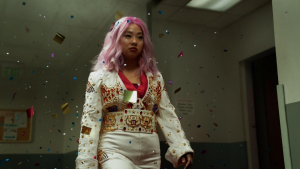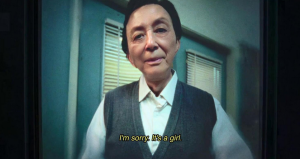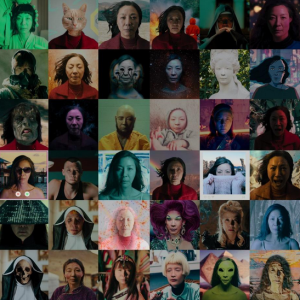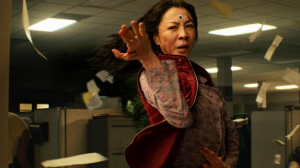108 Everything Everywhere All at Once (2022)
Representing Intergenerational Family Trauma in Everything Everywhere All at Once (EEAAO)
By Kayley Martinez
Everything Everywhere All at Once (EEAAO) is impossible to decode or intellectualize into one simple ethos. This film injects nihilism and absurdity on a journey through the multiverse, while simultaneously providing a sentimental narration of the seemingly mundane life of Asian-American immigrant family, the Wangs. A.O. Scott, chief film critic from The New York Times, describes EEAAO as an “exuberant swirl of genre anarchy.” To put it in simple terms, Everything Everywhere All at Once is an immigrant melodrama that takes us on a therapeutic journey of generational reconciliation between Evelyn (Played by Michelle Yeoh, a Malaysian actor who found fame in Hong Kong alongside Jackie Chan [Corona]) and her daughter, Joy (Played by up-and-coming Asian-American actor Stephanie Hsu [IMDb]). This film provides us with a raw representation of interfamilial conflicts in Asian-American families and the trauma that comes along with those conflicts. This movie addresses broad ideological concepts and conventions of thought while employing dazzling and imaginative sound design (composed by Son Lux), colorful editing, and chaotic, spinning cinematography.
EEAAO was released in 2022 and first conceptualized in 2016 by Daniel Scheinert and Daniel Kwan, collectively known as the “Daniels,” a euphemism omitting Kwan’s surname (Li). According to the Atlantic article, “How Hollywood’s Weirdest Filmmakers Made a Movie about Everything” by Shirley Li, “they poured their own experiences and apprehensions, and slowly, over the course of six years, what started as an ambitious story about the multiverse morphed into a sentimental tale about the remarkable connections people forge amid overwhelming chaos.” Asian-American Director Daniel Kwan has spoken about encoding and incorporating elements of conversations he has had with his own parents into the literature within the movie, as well as incorporating his own lived experience with ADHD into Evelyn’s character (Li). The frantic editing and cinematographic style that often cuts to multiverse side tangents (Such as a universe where humans evolved to have hot dogs for fingers) is also representative of the disorganized mind of someone suffering with this disorder. In this article, Li goes on to say, “It is… an examination of the what-ifs embedded into immigrant stories, the code- and language-switching that come with such a shift, and the infinite choices a person can make across a lifetime. Everything Everywhere is about the potential annihilation of time and space, but it is also a reminder of how extraordinary it is to exist at all, for a time, in a space.”

Michelle Yeoh also incorporated elements of her own life into Evelyn’s character. At one point in the film, Evelyn experiences a reality where she did not leave her husband, becoming a famous martial artist, which reflects Michelle’s lived experience. The Daniels even went as far as to write Evelyn’s name as “Michelle Wang” from the beginning, which Michelle refused. As Yeoh explains, “Evelyn deserves her own story to be told. This is a very ordinary mother (and) housewife who is trying her best to be a good mother to her daughter, a good daughter to her father, a wife that is trying to keep the family together …. the characters that I play… deserve their own journey and their stories to be told” (Radulovic).
Everything Everywhere All at Once starts on the eve of the Chinese New Year. Evelyn Wang struggles to cope with the stress of running a laundromat business when it is audited by the IRS, compounded with the new arrival of her mostly wheelchair-bound elderly father from China (Played by James Hong, founder of the oldest Asian American theater in Los Angeles, president, and charter member of the Association of Asian Pacific American Artists [IMDb]), her unwillingness to accept her daughter Joy’s sexuality, as well as her daughter’s miscegenetic relationship with a young white woman named Becky (Played by white American actor Tallie Medel [IMDb]). Unbeknownst to Evelyn, a divorce is looming from her husband, Waymond (Played by Ke Huy Quan, a Vietnamese American actor and child star of The Goonies [IMDb]). Evelyn is going through the motions of an unsuccessful life and in doing so is emotionally absent towards the needs of her family, and on top of it all, she must prepare for her Chinese New Year Party.
There is an obvious hierarchy that is being negotiated in this film, with certain members of the family struggling for power, with Evelyn acting as head of the household and therefore burdened with an intense amount of emotional labor. According to Qijun Han’s book, The Cinematic Representation of the Chinese American Family, one of the challenges of the structural changes to the immigrant family is “changing roles of Chinese men in a capitalist society: men were no longer the only or main breadwinners in the family due to downward mobility. On the contrary, women were obtaining increasing levels of economic independence” (41). The dynamic between Evelyn and Waymond clearly expresses this. She has deemed her husband Waymond as incompetent, claiming that “his survival depends on her” (0:08:13) and is often feeling compelled to clean up after Waymond. Evelyn’s father thought Waymond was weak and “silly.” Later in the movie, Waymond expresses that his kindness and optimism is “strategic and necessary,” as a mode of survival, defying the gendered expectations Gong and Evelyn have for him (1:42:04).
One way in which difference is expressed in EEAAO is the cultural differences between Joy and her girlfriend, Becky. At times, Becky cannot read the tension and role strain Joy is experiencing. She is quite eager to meet Becky’s family and is unconcerned with any possibility of a negative interaction. Joy, on the other hand, (0:03:44) warns Becky her mom might “say something dumb” like “call her fat.” She proceeds to fold down Becky’s sleeves to conceal her tattoos. These tensions come to a breaking point for Joy when Evelyn takes advantage of the language barrier between Joy and her grandfather, to whom Becky is being introduced (0:09:57). Due to his traditional beliefs, both Evelyn and Joy have much anxiety surrounding Gong Gong’s perception of them. Instead of being honest about Joy’s identity, Evelyn lies to her father by telling him Becky is a “very good friend” when Joy forgets the Mandarin word for “girlfriend.”

Intergenerational and intercultural conflict is not an uncommon theme for immigrant families due to the differences in ideology, institutions, and values between cultural and social conventions within the United States and China. Feelings of disconnection can form between the generations within immigrant families transitioning to the United States. Han states that within immigrant families, “the generational conflicts between parents and children are enlarged and intensified due to the belief that the parent fails to live up to the expectations of children, of society, and even of themselves in the overall parental role” (42). This intergenerational conflict is represented by Evelyn’s eventually rivalry between Jobu Tupaki, whom, in another universe named the “Alpha Universe” embodies metaphysical and cosmogenic chaos. It is revealed that this Jobu Tupaki is Joy, and in the Alpha-verse her mind was pushed to the limit, fractured by Alpha-verse Evelyn. This split her consciousness, so she is truly experiencing everything, everywhere, all at once. Joy becomes an “omniversal being,” by the name of Jobu instead of succumbing to her altered mind (0:36:06). She is an “agent of pure chaos, with no motives or desires.” She is an uncontrollable, unstoppable feminine force filled with rage and confusion. Her embodiment of nihilistic existentialism is a metaphor for the role strain that Joy is subjected to by her mother which has pushed her past her breaking point.
Differences are negotiated intergenerationally with her mother, who reluctantly accepts Joy’s sexuality and race, constantly reminding Joy that it is a privilege that she is accepting of her sexuality (0:05:48). When Alpha-verse Waymond teaches Evelyn to “verse jump,” her life flashes before her eyes in the elevator of the IRS office before their audit appointment (0:14:49), and we learn that Evelyn was disowned by her father for making the decision to “make her own way” by moving to America with Waymond. Although both Waymond and Evelyn are accepting of Joy’s identity, and not disowning their daughter, Evelyn does not empathize or take the time to try to understand Joy, causing Joy to become resentful and estranged. Joy is put under an immense amount of pressure to perform appropriately for her family, as well as Becky.
Power and differences are policed by discrimination within the family, mostly by Evelyn’s father towards Evelyn. Evelyn projects this discrimination, repeatedly reminding Joy that she is “getting fat” (0:10:52). Evelyn’s scrutiny of her daughter’s decisions (For example, dropping out of college, and getting tattoos) and sexuality might be a generational curse from her own father’s scrutiny, and the projections of her own failings and doubts regarding her unsuccessful life. These failings are institutionally reinforced, and not entirely Evelyn’s fault. From the moment she was born, she was unwanted. We see this in the flashback sequence previously mentioned (0:14:49) at the beginning of the movie. Evelyn watches her birth, and the doctor apologizes to her father because she is a girl, and not a boy. Evelyn discriminates against her daughter, projecting gendered doubt just as her father did to her, causing chronic feelings of disempowerment for both Evelyn and Joy.

Jobu Topaki seeks Evelyn out to show her the “everything bagel,” (1:00:00) which she has quite literally put everything onto. This bagel, which has essentially become a black hole dissolving all matter in its path, is what Jobu claims is “The truth, that nothing matters.” She tells Evelyn that “If nothing matters, then all the pain and guilt you feel from making nothing of your life goes away.” This is a pivotal moment, because Jobu has finally gotten Evelyn’s attention, and Evelyn is not dismissive of her. By showing her this black hole- through a portal created with their own hands, there is a moment of intimacy between the two, where Jobu helps her “open up her mind.”
Around 1:02:42, Alpha-verse Gong makes his first appearance by throwing Jobu through the wall with his motorized wheelchair during this intimate moment. Alpha-verse Waymond directly disobeyed his orders in order to find Evelyn to teach her to harness her powers to defeat Jobu. For Gong, he sees this as compromising another mind. But Waymond sees things differently; because Evelyn is living the worst version of herself, for every failure, another Evelyn in another universe is successful. Alpha Gong doubts her mental capacity, and insists she kill the Joy she knows because it is “one less universe she (Jobu) can access.” (1:05:19) and a “necessary sacrifice” to win the war against Jobu.
According to a sociological study regarding the influence of parent expectations and parent‐child relationships on mental health in Asian American and White American families, “Asian American young men are taught to focus more on sacrifice and leadership whereas young women are taught to focus on family honor and being caretakers” (Warikoo). This explains Alpha Gong’s strong sense of justice, even if it means sacrificing his granddaughter. When Evelyn cannot bring herself to kill her daughter, Alpha Gong turns against them, blaming Evelyn for the creation of Jobu. Evelyn realizes that if she created Jobu, she can have equivalent power. She demonstrates her ability by verse jumping, and communicating to Alpha Gong that this what she needs to do despite his doubts. In the language of some type of wild animal, she tells Alpha Gong “If I can become like her, maybe I’ll be strong enough to save my Joy.” This scene is important in constructing an absurd metaphorical arena for how intergenerational conflict unfolds between this family, as well as allowing Evelyn to have a stage to demonstrate her independence despite her father’s doubts and threats.
In the second part of this movie, Evelyn has pushed herself to her full mental capacity, and when faced with Jobu, asks her why she is seeking her out. By falling through a crack on the couch in their home, Evelyn is taken to Jobu’s black-hole everything bagel. Jobu explains that she and Joy are inseparable personalities. It cuts to a flashback scene of Joy in the car with Evelyn, with a painful, tearful expression. We know that this is a flashback sequence because of the change to 4:3 aspect ratio, which is used during Evelyn’s flashback sequence as well. Jobu explained that trapping her in definitions of “right” and “wrong,” specifically regarding her sexuality, was a painful experience. Evelyn tries to go on to explain the difference in generation between Joy and Gong Gong, and Jobu interrupts to tell her that if she surrenders to the black hole, the “truth” that nothing matters, she will be free from those conventions of right and wrong. Jobu explains that she did not want to kill Evelyn, but simply needed someone to really see her and experience her pain. This is also a pivotal moment in the film because Evelyn finally lets go of expectations, such as her marriage, taxes, and everything in every universe, experiencing every lifetime at once, truly experiencing her daughter’s pain.

This is one of the most visually overwhelming moments in the film (1:39:07). For about a minute, dozens of different Evelyn portraits are flashed onto the screen. Some are animated, some Evelyns we have already seen, some we have not. Some Evelyns are screaming, laughing, crying, smiling, or blank-faced. The Daniels use lighting to intensify the disorientation of the scene. Swirling colored lights illuminate her face, and the soundtrack sounds as if an orchestra has been sped up and reversed on a record player, and then stops abruptly (1:39:38). The scene dissolves into an aerial shot of a universe where no life is formed, and she and Joy have a conversation with subtitles as rocks.
This sudden transition from visually exhausting elements to a silent, subtitled conversation captures the gravity of the conversation between Evelyn and her daughter. Joy tells Evelyn she was hoping that she would see something she did not, that she wanted her mother to convince her there was another way. She did not want to destroy the world, but herself. Entering the black hole is a euphemism for suicide. Historically, Chinese women have struggled with suicide. According to Han, “before the Chinese Civil War took place in 1946, China was the only country where the suicide rate of women was higher than that of men, the peak being among women aged 15-35… For a Chinese woman, traditional family life meant suppressing one’s feelings, unquestioned self-sacrifice, and unconditional obedience to men” (28).

At the end of this film (1:59:51), when Evelyn is trying to save her daughter from entering the black hole bagel. She applies Waymond’s philosophy of kindness when fighting the Alpha-verse thugs sent by Alpha Gong, quite literally inverting the power of the black hole. When she is shot, she stops time, turning bullets into googly eyes and deflecting them. By fighting like her husband Waymond, she uses harmony and kindness, quite literally chaotic good to find relief for those she is battling. This might echo the philosophical ideas of yin and yang. Alpha-verse Gong tries to stop her from saving Joy, and she asserts to him that she is “No longer willing to do to my daughter what you did to me… You may see in her all your greatest fears squeezed into one person. I spent most of her childhood praying she would not end up like me… But she turned out to be stubborn, aimless, a mess, just like her mother.” Despite Joy trying to escape the situation, she introduces Becky as Joy’s girlfriend. Without another word, Gong lets her go, but assists in helping Evelyn to keep her from falling into the black hole. Gong comes around in the end, accepting Becky and therefore his daughter’s sexuality.
Before allowing Joy to leave when they are speaking in the parking lot (2:04:44), after letting Joy fall into the black hole at her request, Evelyn asserts her values and beliefs; she thinks Joy is withdrawn, she does not like tattoos, she thinks she is getting fat, and it does not make any sense that out of the endless possibilities in life she would want to stay with the version of her daughter she did not like. She reminds Joy that it made no sense for her to come looking for her mother through all those possibilities either. Despite all the versions of Joy that could be perfect, she accepts her for who she is, asserting that she wants to spend the small amount of time within their world that makes sense with her daughter and no one else. In doing so, Joy is saved from the black hole. According to a sociological study mentioned previously, they found that the “quality of parent-child relationships is associated with mental health outcomes… the association between parent expectations and mental health outcomes is insignificant after controlling for these relationships… [The findings] suggest that focusing on improving parent-child relationships, as opposed to altering parents’ expectations, might lead to improved mental health outcomes for Asian American youth” (Warikoo). At the end of the day, neither Evelyn nor Joy had to let go of their identity, or their values, and instead learned to repair their relationship.
In my year spent working at the local art house cinema, I have not seen a movie instill an emotional reaction quite like this one. On multiple occasions, I witnessed and even consoled crying moviegoers. Others walked out of the auditorium dazed and confused, others like they had just seen a ghost, and others laughing hysterically. I gave a hug to one woman in tears, who told me that EEAAO made her feel understood as a child of an Asian American immigrant, and even went as far as to say that it was therapeutic.
But it was not everyone’s cup of tea. The first time I saw this movie, I forgot that anything else existed ten minutes into the movie, and by the end, I forgot whether I was crying because I was heartbroken, or thankful. On the other hand, the friend I brought along struggled to follow, and was left confused. Another friend I showed this movie to nearly threw up. Everything Everywhere All at Once might not resonate with everyone, the nature of the film is as chaotic, messy, and at times completely aimless as the Wangs. Nevertheless, his film can provide a microcosm of life as an immigrant family trying to survive in the United States, at the same time, capturing all-encompassing feelings of disconnection, existential dread, generational trauma, and frustration in a bombardment of limitless possibilities, all answering one simple question, “What if?”
This sense of existentialism is a pondering we’ve all inquired to, much more frequently now than ever in the shadow of a pandemic. After widespread isolation in the company of chronic inundation of content from social media, the Daniels were compelled to make sense of the chaos, of the what if’s, of the characters we perform, of our generational curses and how to heal our minds when at mental capacity. All of this is through the lens of an immigrant family trying to make ends meet and survive in a society where at times, the odds are stacked against them. The absurdity acts a vessel for the delivery of the also very absurd ideas of this film, such as a universe where everyone has hotdog hands, martial arts fight sequences involving buttplugs, and a bagel with literally everything on it that can consume all matter at the hands of Evelyn’s daughter (But not really). There is no one way to articulate this film, just like there is no one way to answer all the what-ifs in life. That all being said, if you see this film make sure to keep some tissues on you, because it is one hell of a ride.
References
Corona, Luz. “MICHELLE YEOH DIDN’T SET OUT TO BE AN INTERNATIONAL MOVIE STAR: The Everything Everywhere All at Once and American Born Chinese Star Just Took on Projects She Believed In.” ADWEEK, vol. 63, no. 13, July 2022. EBSCOhost, https://search.ebscohost.com/login.aspx?direct=true&db=edsbig&AN=edsbig.A711576386&site=eds-live.
IMDb, “Everything Everywhere All at Once.” IMDb.com, 25 Mar. 2022, https://www.imdb.com/title/tt6710474/.
Han, Qijun. The Cinematic Representation of the Chinese American Family. United Kingdom, Cambridge Scholars Publishing, 2016.
Li, Shirley. “How Hollywood’s Weirdest Filmmakers Made a Movie about Everything.” The Atlantic, Atlantic Media Company, 23 Apr. 2022, https://www.theatlantic.com/culture/archive/2022/04/daniels-directing-everything-everywhere-all-at-once/629503/.
Radulovic, Petrana. “Michelle Yeoh’s Personal Guide to Everything Everywhere All at Once’s Vast Multiverse.” Polygon, 11 Apr. 2022, https://www.polygon.com/23020865/michelle-yeoh-interview-everything-everywhere-all-at-once.
Scott, A. O. “’Everything Everywhere All at Once’ Review: It’s Messy, and Glorious…’.” The New York Times, The New York Times, 24 Mar. 2022, https://www.nytimes.com/2022/03/24/movies/everything-everywhere-all-at-once-review.html.
Warikoo, Natasha, et al. “The Influence of Parent Expectations and Parent‐Child Relationships on Mental Health in Asian American and White American Families.” Sociological Forum, vol. 35, no. 2, 2020, pp. 275–296., https://doi.org/10.1111/socf.12583.

